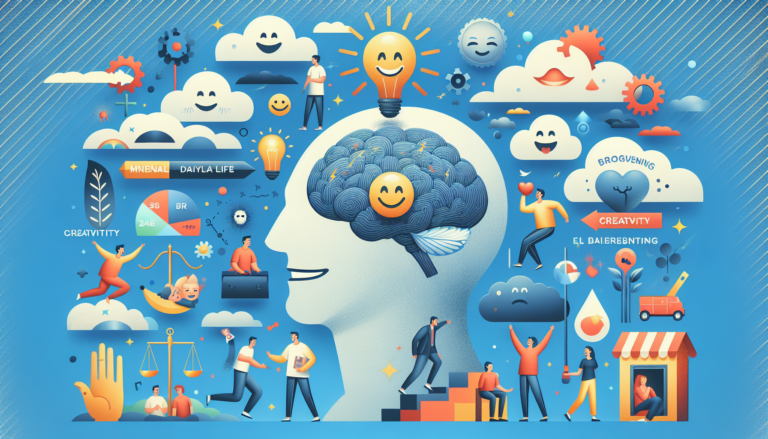Finding Clarity In Chaos: A Guide To Inner Peace
In today’s fast-paced and chaotic world, it’s easy to feel overwhelmed and lose sight of our inner peace. But fear not, because “Finding Clarity in Chaos: A Guide to Inner Peace” is here to help you navigate through the chaos and discover a sense of tranquility within yourself. This insightful article explores practical techniques and strategies that can bring about a state of clarity amidst the whirlwind of daily life. So, take a deep breath, and let’s embark on a journey towards finding inner peace together.
Understanding Inner Peace
Defining Inner Peace
Inner peace is a state of harmony and calmness that comes from within. It is a deep sense of tranquility and contentment that is not affected by external circumstances. Inner peace allows you to stay centered and grounded, even in the midst of chaos and challenges. It is a state of being that is free from stress, anxiety, and negativity.
The Benefits of Inner Peace
Inner peace offers numerous benefits for your overall well-being. When you cultivate inner peace, you experience reduced stress levels, improved mental clarity, and increased emotional stability. It enhances your ability to cope with difficult situations and promotes better decision-making skills. Inner peace also improves your physical health by lowering blood pressure, boosting the immune system, and improving sleep quality. Furthermore, it enhances your relationships, as you are able to approach others with compassion and understanding.
The Connection Between Chaos and Inner Peace
Chaos refers to the disorder and confusion that can arise in various aspects of life. It can manifest externally, such as in a cluttered and disorganized physical space, or internally, through racing thoughts and emotional turbulence. Inner peace serves as an antidote to chaos, as it helps you navigate and find clarity amidst the turmoil. When you have inner peace, you are better equipped to handle chaotic situations without being overwhelmed or reactive.
Recognizing the Chaos in Your Life
Identifying External Chaos
External chaos can manifest in different areas of your life, such as a messy home, a cluttered workspace, or overwhelming schedules and responsibilities. It can also be found in toxic relationships or environments that drain your energy and contribute to feelings of unease. By identifying and acknowledging external chaos, you can take steps to create a more harmonious and peaceful external environment.
Recognizing Internal Chaos
Internal chaos refers to the turbulence that occurs within your mind and emotions. It can manifest as incessant worrying, negative self-talk, or a constant feeling of restlessness. Internal chaos often stems from unresolved emotional issues, past traumas, or an inability to manage stress effectively. Recognizing and acknowledging your internal chaos is an essential step in the journey towards inner peace.
How Chaos Affects Your Mind and Body
Chaos takes a toll on both your mind and body. It can lead to increased stress, anxiety, and feelings of being overwhelmed. Chronic chaos can disrupt your sleep patterns, weaken your immune system, and contribute to various physical ailments. Mental health may also be impacted, with symptoms such as depression, irritability, and difficulty concentrating. Recognizing the impact of chaos on your well-being motivates you to seek inner peace as a means of restoring balance and harmony.

Practicing Mindfulness
Understanding Mindfulness
Mindfulness is the practice of being fully present in the moment and paying attention to your thoughts, emotions, and sensations without judgment. It involves cultivating a non-reactive and accepting attitude towards your experiences. By practicing mindfulness, you develop an awareness of your inner state and the external world, allowing you to respond to life’s challenges with greater clarity and equanimity.
Benefits of Mindfulness
Mindfulness offers a multitude of benefits for nurturing inner peace. It promotes emotional regulation by helping you observe your thoughts and emotions without getting caught up in them. Mindfulness also reduces stress, lowers anxiety levels, and improves overall mental well-being. It enhances self-awareness and fosters a deeper connection with yourself and others. Moreover, mindfulness practices have been found to have positive effects on physical health, such as reducing blood pressure and boosting immune function.
Techniques for Practicing Mindfulness
There are various techniques you can incorporate into your daily life to cultivate mindfulness. One popular technique is formal meditation, where you dedicate a specific time to sit quietly and focus your attention on your breath or a chosen object. Informal practices include mindful eating, walking, and even doing everyday tasks with full attention. Additionally, mindfulness can be integrated into your interactions with others, allowing you to truly listen and be present in your relationships.
Embracing Acceptance
Understanding Acceptance
Acceptance is the act of acknowledging and embracing reality as it is, without resistance or judgment. It involves letting go of the need to control or change things that are beyond your control. Acceptance does not imply passivity or resignation; rather, it empowers you to respond to life’s challenges with grace and openness.
The Power of Accepting What Is
Accepting what is allows you to release attachment to outcomes and surrender to the present moment. When you resist or deny reality, you create inner turmoil and prolong suffering. Acceptance liberates you from the grip of negative emotions and opens up space for growth and transformation. By accepting the imperfections of life, you can find peace and contentment in the midst of chaos.
Practicing Acceptance in Everyday Life
Practicing acceptance involves shifting your mindset and adopting a more open and flexible attitude towards life. Start by observing your resistance and judgments, and consciously choose to let go of them. Cultivate gratitude for what you have and focus on what you can control. It is also helpful to regularly remind yourself that it is okay to make mistakes and encounter difficulties, as they are part of the human experience.

Managing Your Thoughts and Emotions
The Role of Thoughts and Emotions in Chaos
Thoughts and emotions play a significant role in chaos, as they can contribute to the turmoil within your mind and affect your overall well-being. Negative thought patterns, such as excessive worrying or self-criticism, can fuel chaos and prevent inner peace from flourishing. Similarly, unmanaged emotions like anger, fear, or resentment can intensify chaos and hinder your ability to find clarity.
Identifying Negative Thought Patterns
To manage chaos, it is crucial to identify and challenge negative thought patterns. Start by becoming aware of recurring negative thoughts and the impact they have on your emotions and behavior. Practice reframing negative thoughts into more positive and realistic perspectives. Engage in self-talk that is compassionate and supportive, rather than critical or judgmental. By actively examining and replacing negative thoughts, you can bring about a more peaceful and harmonious internal state.
Cultivating Positive Thoughts and Emotions
Cultivating positive thoughts and emotions is essential for nurturing inner peace. Engage in activities and practices that bring you joy, gratitude, and contentment. Surround yourself with positive influences, such as uplifting music or inspiring books. Practice self-compassion and treat yourself with kindness and understanding. By consciously cultivating positivity, you create an inner environment that is conducive to peace and tranquility.
Creating a Calm Environment
The Importance of Your Physical Space
Your physical environment significantly impacts your mental and emotional well-being. A cluttered and disorganized space can contribute to feelings of overwhelm and chaos. On the other hand, a clean and organized environment promotes a sense of calm and clarity. Creating a calm physical space is crucial for cultivating inner peace.
Decluttering and Organizing
Start by decluttering and organizing your living and working spaces. Remove unnecessary items and create designated spaces for belongings. Minimize distractions by organizing your workspace and creating systems that support productivity. Embrace simplicity and create an environment that promotes a sense of calm and serenity. A clutter-free space allows for better mental clarity and reduces stress.
Creating a Peaceful Atmosphere
Enhance the calmness of your environment by incorporating elements that promote relaxation and peace. Consider diffusing essential oils known for their calming properties, such as lavender or chamomile. Use soft lighting, such as candles or dimmed lamps, to create a tranquil ambiance. Play soothing background music or nature sounds to create a peaceful atmosphere. By intentionally creating a peaceful atmosphere, you encourage a sense of tranquility and invite inner peace into your life.
Establishing a Routine
The Benefits of Routine
Establishing a daily routine provides structure and stability, which are crucial for finding inner peace. A routine creates a sense of predictability and allows you to prioritize self-care and activities that promote well-being. It helps reduce decision fatigue and allows you to conserve mental energy for what truly matters. Having a routine also promotes balance by ensuring you allocate time for work, relaxation, and personal growth.
Creating a Balanced Daily Schedule
Design a daily schedule that encompasses activities that support your physical, mental, and emotional well-being. Dedicate time for self-care practices, such as exercise, meditation, or engaging in hobbies you enjoy. Allocate time for work and tasks, ensuring they are manageable and realistic. Include breaks and periods of relaxation to prevent burnout. By creating a balanced daily schedule, you cultivate a sense of order and harmony in your life.
Incorporating Self-Care into Your Routine
Self-care is an essential component of inner peace. Prioritize self-care by allocating time each day for activities that nourish your mind, body, and soul. Engage in activities that bring you joy, such as reading, taking baths, or spending time in nature. Practice self-compassion and give yourself permission to rest and recharge. By making self-care a priority, you replenish your energy and foster a greater sense of well-being.
Nurturing Healthy Relationships
The Influence of Relationships on Inner Peace
The quality of your relationships can significantly impact your inner peace. Healthy and supportive relationships nourish your soul, provide a sense of belonging, and contribute to your overall well-being. On the other hand, toxic or draining relationships can disrupt your inner peace and cultivate chaos in your life. Nurturing healthy relationships is crucial for finding and maintaining inner peace.
Identifying Toxic Relationships
Take time to reflect on your relationships and identify any that may be toxic or unhealthy. Toxic relationships can be emotionally draining, manipulative, or abusive. They often contribute to feelings of chaos, stress, and negativity. Recognizing toxic relationships is the first step towards cultivating a peaceful and harmonious social circle.
Building Supportive and Nurturing Connections
Nurture relationships that bring positivity, love, and support into your life. Surround yourself with people who uplift and inspire you. Seek connections with individuals who share similar values and support your growth. Cultivate empathy, compassion, and understanding in your interactions with others. By fostering nurturing connections, you create a social environment that enhances your inner peace and well-being.
Prioritizing Self-Care
Understanding Self-Care
Self-care involves taking deliberate actions to care for your physical, mental, and emotional well-being. It is about prioritizing your needs and ensuring you are nourishing yourself on all levels. Self-care is not selfish; it is an essential practice for cultivating inner peace and overall happiness.
Self-Care Practices for Inner Peace
There are various self-care practices you can engage in to promote inner peace. Engage in regular exercise or physical activity to reduce stress and promote well-being. Practice mindfulness and meditation to cultivate mental clarity and emotional balance. Prioritize alone time to recharge and reflect. Engage in activities that bring you joy and fulfill your passions. By incorporating self-care practices into your life, you nurture your inner peace and well-being.
Finding Time for Self-Care
Finding time for self-care in a busy and chaotic world can be challenging, but it is crucial for finding inner peace. Start by prioritizing self-care and setting clear boundaries. Delegate tasks and ask for support when needed. Break down self-care activities into manageable chunks and integrate them into your daily routine. Remember that self-care is a necessity, not a luxury, and carve out time for yourself without guilt. By making self-care a priority, you create space for inner peace to thrive.
Seeking Professional Help
When to Seek Professional Help
While the practices discussed above can greatly contribute to finding inner peace, there may be times when seeking professional help is necessary. If you find that your chaos and inner turmoil persist despite your best efforts, it may be beneficial to reach out to a professional for guidance. Additionally, if your mental health is significantly impacted or you are experiencing severe distress, seeking professional help is crucial.
Types of Professionals to Consider
When seeking professional help, consider reaching out to licensed therapists, psychologists, or counselors. These professionals are trained to provide support and guidance in navigating through challenges and finding inner peace. Other professionals who can assist you in different capacities include life coaches, meditation teachers, or spiritual advisors. Choose a professional who aligns with your needs and values.
The Role of Therapy in Finding Inner Peace
Therapy can be a powerful tool for finding inner peace. Therapists provide a safe and non-judgmental space for you to explore your emotions, gain insights, and develop coping strategies. They can help you uncover and heal past wounds, manage stress and anxiety, and cultivate positive thought patterns and behaviors. Therapy sessions offer a supportive and confidential environment for your personal growth and journey towards inner peace.
In conclusion, finding inner peace amidst chaos is a journey that requires dedication and self-reflection. By understanding the nature of inner peace, recognizing the chaos in your life, practicing mindfulness, embracing acceptance, managing your thoughts and emotions, creating a calm environment, establishing a routine, nurturing healthy relationships, prioritizing self-care, and seeking professional help when needed, you can cultivate a deep sense of tranquility and harmony within yourself. Embrace the journey towards inner peace, and may it bring you a lifetime of serenity and contentment.







